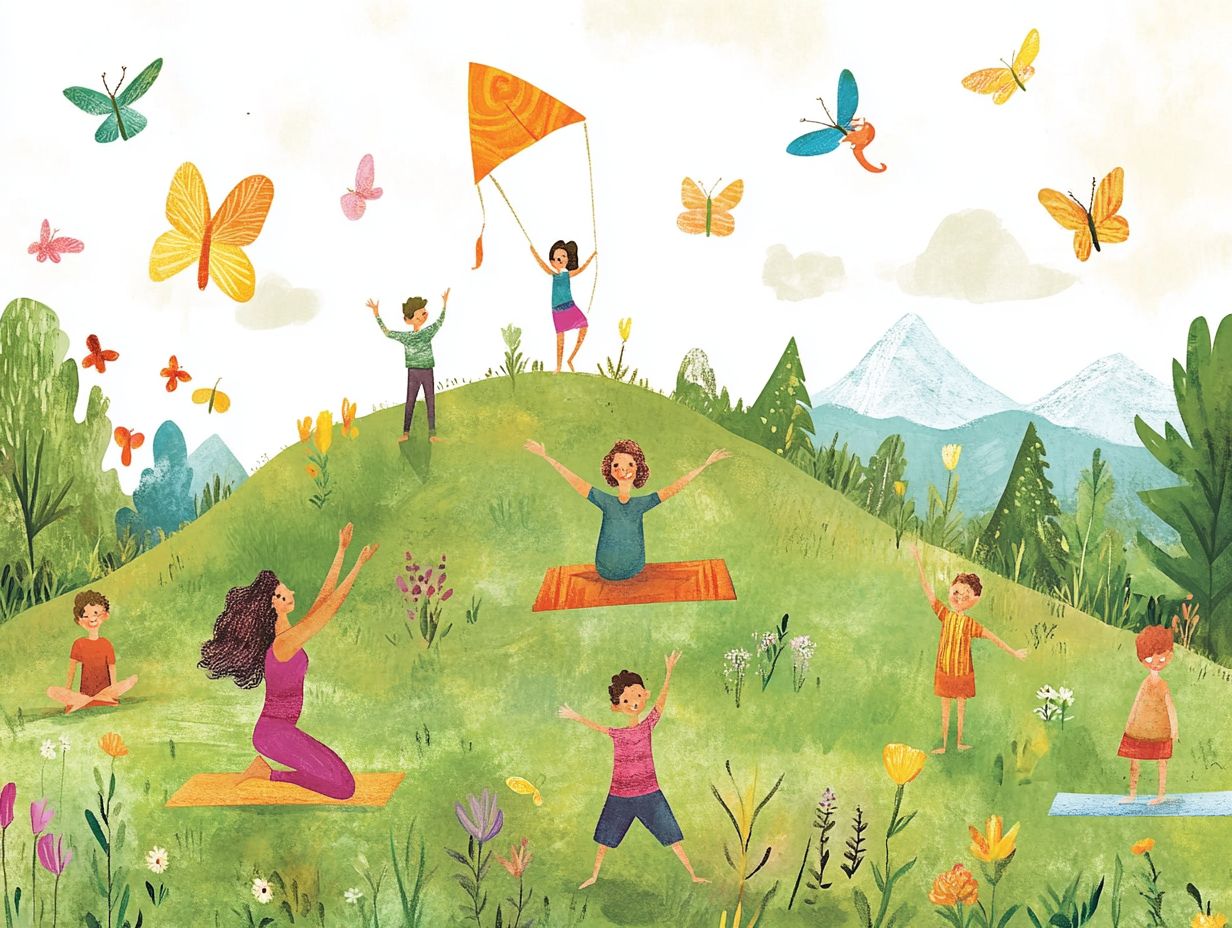Mindfulness and Play: Finding Balance Together
In your fast-paced world, the concepts of mindfulness and play may seem separate, yet they hold the key to achieving harmony in your life. Mindfulness encourages you to be fully present, cultivating awareness and clarity. At the same time, play opens the door to creativity and joy. Integrating mindfulness practices, which include activities like meditation and deep breathing, with play can lead to significant stress reduction and personal growth.
This journey explores the powerful synergy between mindfulness and play, revealing how their combination can significantly enhance your well-being and relieve stress. Incorporating these practices can also improve your work-life balance and mental health.
You will discover practical activities tailored for both children and adults, learning how to seamlessly weave mindful play into your daily routine for a happier, more balanced life. These activities include yoga practice, deep breathing, and other methods that can enhance your overall emotional intelligence, defined as your ability to understand and manage your emotions.
Contents
- Key Takeaways:
- What Is Mindfulness?
- What Is Play?
- How Can Mindfulness and Play Work Together?
- 1. Mindful Play: The Benefits of Combining Mindfulness and Play
- 2. Mindful Play Activities for Children
- 3. Mindful Play Activities for Adults
- How Can Mindfulness and Play Help with Stress and Anxiety?
- Mindful Play: A Tool for Self-Discovery and Personal Growth
- Incorporating Mindful Play into Daily Life
- 1. Mindful Play for Better Relationships
- 2. Mindful Play for Improved Work-Life Balance
- 3. Mindful Play for Overall Well-being and Happiness
- Frequently Asked Questions
- 1. What is mindfulness and play, and how do they relate to each other?
- 2. How can mindfulness and play benefit our mental and emotional well-being?
- 3. Can children benefit from practicing mindfulness and play together?
- 4. How can we incorporate mindfulness and play into our daily routines?
- 5. Can mindfulness and play be beneficial in the workplace?
- 6. How can we find a balance between mindfulness and play in our daily lives?
Key Takeaways:
- Mindfulness and play can work together to provide a range of benefits, including stress and anxiety relief, self-discovery, and personal growth.
- Both children and adults can benefit from incorporating mindful play activities into their daily lives, fostering personal growth and inner peace.
- Mindful play can also contribute to better relationships, improved work-life balance, and overall well-being and happiness. It also encourages self-care and emotional wellness.
What Is Mindfulness?
Mindfulness is a transformative mental practice that invites you to be fully present in each moment, gently focusing on your thoughts, feelings, and bodily sensations without judgment. This practice supports intentional living and enhances your psychological well-being.
Recent studies, including those from Harvard University, highlight that including mindfulness in your daily life can greatly elevate your emotional intelligence and psychological well-being, ultimately enhancing your mental health and reducing stress. Engaging in daily routines that promote mindfulness can lead to significant improvements in your happiness levels.
By embracing mindfulness practices such as meditation, you can cultivate a profound sense of inner peace while strengthening your capacity for mindfulness an essential tool for navigating the complexities of modern life with grace and balance. These practices also contribute to stress management and enhance your mental health awareness.
What Is Play?
Play is an essential element of the human experience, nurturing creativity, personal growth, and social connection. When you engage in playful activities, you not only boost your happiness but also significantly enhance your emotional wellness by exploring your feelings and building relationships.
Whether it’s through structured games or spontaneous fun, play acts as a vital tool for improving your well-being, aiding stress management, and fostering a positive mindset. Both adults and children can reap the rewards of weaving play into their daily lives, as it cultivates deeper emotional intelligence and strengthens personal connections.
How Can Mindfulness and Play Work Together?
The integration of mindfulness and play crafts a distinctive synergy that elevates both mental health and emotional intelligence, yielding transformative results in personal growth. This synergy can enhance workplace culture and promote corporate wellness.
When you engage in mindful play, you immerse yourself in playful activities while remaining fully present and aware. This practice can notably reduce stress and enhance your connections with yourself and those around you. It also supports emotional well-being and physical health.
Not only does this approach boost creativity, but it also strengthens your well-being practices, fostering a harmonious balance between work and personal time. By embracing mindful transitions during play, you can cultivate greater happiness and enrich your overall engagement in life.
In conclusion, integrating mindfulness and play into your life can lead to profound changes in your emotional wellness and personal growth. Start your journey towards a happier, balanced life today!
1. Mindful Play: The Benefits of Combining Mindfulness and Play
Mindful play offers numerous benefits. It can significantly reduce workplace stress and enhance emotional wellness.
By immersing yourself in the present moment, you cultivate improved focus and concentration. This translates into greater work efficiency and a heightened capacity for mindfulness.
This whole approach encourages personal reflection and deepens your connection with your feelings. Ultimately, it enhances your emotional intelligence.
Supported by various studies, the transformative effects of mindful play are substantial. They contribute to an overall enhancement of well-being practices.
When you engage in mindful play, you step away from daily pressures and dive into activities that spark joy and creativity. These serve as a powerful antidote to stress.
Research shows that through this intentional practice, you often uncover a renewed sense of clarity and perspective on your emotions. This aids in better emotional regulation.
Workplaces that promote mindful play foster a collaborative atmosphere. This leads to increased morale and productivity among team members.
This interplay between personal growth and communal well-being underscores the importance of weaving mindful play into your daily routine as a sustainable practice for overall mental health.
2. Mindful Play Activities for Children
Incorporating mindful play activities into your child s routine is crucial. It nurtures their creativity and emotional intelligence while supporting their overall mental wellness.
Consider activities like mindful movement, which includes gentle exercises such as yoga and deep breathing. These practices enable your child to manage their emotions and cultivate essential skills for personal growth.
By introducing games that promote focus and awareness, you help them develop a sense of inner peace and healthy coping strategies for stress and anxiety. These mindful practices serve as a foundation for resilience and well-being as they navigate their journey through life.
Engaging in creative arts, like painting or music, encourages your child to express themselves freely. This fosters a deeper understanding of their feelings and enhances their imaginative capabilities.
Nature exploration activities offer a splendid opportunity for them to connect with their environment. They spark curiosity and practice mindfulness through keen observation, significantly boosting their mental wellness and social connection.
Incorporating storytelling, where your child articulates their thoughts and emotions, further strengthens their social skills and empathy.
By varying these mindful play activities, you help children relish their childhood experiences. You also equip them for the complexities of life with emotional awareness and creative problem-solving abilities. This comprehensive approach nurtures their overall psychological well-being.
3. Mindful Play Activities for Adults

Engaging in mindful play activities serves as a powerful antidote to workplace stress. It promotes both creativity and emotional wellness.
Activities like mindful eating and creative breaks allow you to step away from your daily routines. You immerse yourself in experiences that foster personal connection and self-care.
These activities provide a chance to explore interests that might otherwise be sidelined by work demands. For example, by participating in art classes or experimenting with new cooking techniques, you can unlock hidden talents and foster creative expression alongside relaxation.
Practices such as gardening or journaling ground you in the moment. They cultivate a sense of achievement and satisfaction.
By incorporating these mindful play activities into your schedule, you effectively navigate stress. This enhances your capacity for joy and self-awareness.
Ultimately, this leads to a more balanced and fulfilling life, promoting better work-life balance and personal time.
Start incorporating mindful play into your routine today for a happier, healthier life!
How Can Mindfulness and Play Help with Stress and Anxiety?
Mindfulness and play hold the remarkable power to alleviate stress and anxiety, thanks to their profound impact on emotional well-being. When you engage in mindful play, you don t just foster a state of relaxation; you also enhance your ability to be present, effectively equipping yourself to manage stress. This practice can also contribute to better anxiety management and attention training.
Research from prestigious institutions like Harvard University substantiates this, showing that mixing fun activities into your mindfulness routine can offer vital relief from anxiety. This integration promotes a healthier mental state and elevates your overall happiness levels, transforming the way you navigate life s challenges.
1. Mindful Play for Stress Relief
Mindful play is an exceptional tool for relieving stress, allowing you to engage in activities that elevate your emotional intelligence and foster personal growth. By focusing on the present moment and incorporating elements of fun, mindful play diminishes the impacts of workplace stress and encourages a more balanced life.
Embracing activities such as yoga and deep breathing exercises can transform your daily routine into refreshing moments of relaxation. These practices positively influence your overall mental health and well-being. They also support the relaxation response and enhance your emotional regulation.
Delving into creative hobbies like painting or crafting provides a wonderful outlet for expression while diverting your focus away from stressors. Outdoor pursuits, such as gardening or hiking, immerse you in nature and cultivate a deep sense of tranquility.
Even simple games, whether they are board games or puzzles, can enhance mindfulness through concentration and joy. These activities promote better mental resilience and support anxiety management.
By incorporating these practices into your daily life, you can take a step back, regain perspective, and recharge your mental resilience. Ultimately, this leads to improved emotional clarity and reduced anxiety, enabling you to navigate life’s challenges with greater ease. This practice also promotes better well-being practices and fosters positive psychology.
2. Mindful Play for Anxiety Relief
Mindful play activities can be highly effective for managing anxiety. Engaging in these practices helps you stay grounded and focused on the present moment, reducing the impact of anxiety on your daily life. Techniques such as mindful movement, tech-free time, and retreating from technology can provide significant anxiety relief.
Engaging in mindful play serves as a powerful antidote to anxiety, equipping you with strategies for emotional wellness and resilience. By mixing mindful transitions into your play, you can sharpen your focus and cultivate a sense of calm even amidst the chaos of life.
For instance, consider integrating deep-breathing exercises while indulging in creative activities like painting or sculpting. This practice can center your thoughts and alleviate stressors.
Outdoor pursuits, such as nature walks, invite you to immerse yourself in your surroundings, promoting mindfulness through sensory experiences listen to the rustling leaves or feel the texture of tree bark beneath your fingers.
Incorporating elements like guided visualization during team sports or cooperative games can significantly enhance your focus and enjoyment. This approach invites you to connect deeply, both physically and emotionally, fostering a community of support and understanding that is vital for combating anxiety.
Mindful Play: A Tool for Self-Discovery and Personal Growth
Mindful play serves as a powerful catalyst for self-discovery and personal growth, allowing you to delve into your inner world and elevate your emotional intelligence.
By engaging in mindful activities be it through creative breaks or personal reflection exercises you can unveil deeper facets of your personality and cultivate a richer understanding of your emotions.
This journey not only promotes emotional wellness but also plays a crucial role in enhancing your happiness and overall psychological well-being.
Try at least one mindful play activity today to experience its benefits firsthand!
1. Using Mindful Play to Connect with Your Inner Self
Using mindful play to connect with your inner self means engaging in activities that foster personal reflection and enhance your emotional intelligence. By immersing yourself in playful experiences, you can tap into your emotions and clarify your thoughts. This promotes both psychological well-being and self-awareness.
Techniques like mindfulness meditation can complement these activities, bolstering your capacity for mindfulness and enabling a deeper connection to yourself. Consider activities such as art therapy, where you create freely without the pressure of perfection. This can be a powerful way to explore your feelings and release stress.
Practices like journaling with creative prompts or taking nature walks can ignite self-discovery, allowing your thoughts and emotions to flow without restraint. Engaging in movement-based play, like dancing or yoga, helps you cultivate bodily awareness and bridges the gap between your mind and body.
By integrating these varied techniques into your routine, you not only enhance your experience of mindful play but also nurture a profound connection with your true self.
2. Mindful Play as a Way to Explore and Express Emotions

Mindful play offers a valuable pathway to explore and express your emotions. It enables you to understand your feelings better and nurtures emotional intelligence by creating safe spaces for creative expression and self-discovery.
When you engage in mindful practices, you enable deeper emotional connections and foster personal growth, ultimately contributing to your overall well-being. For instance, activities like storytelling and role-playing can unlock hidden feelings.
This allows you to step into different perspectives and gain a better understanding of your emotions. Art projects, such as drawing or painting, provide a visual outlet where colors and shapes can represent feelings that might be challenging to put into words.
Practices like yoga or gentle movement help ground you, connecting your body and emotions on a deeper level. By incorporating these activities into your life, you create an enriching environment where emotions are acknowledged and expressed.
This fosters a holistic approach to emotional health.
3. Mindful Play for Developing Creativity and Imagination
Mindful play plays a crucial role in cultivating your creativity and imagination. It creates an atmosphere where you can think outside the box and engage in innovative thinking.
By participating in activities that encourage exploration and experimentation, you can broaden your creative horizons while also enhancing your emotional wellness. Techniques like mindful movement and artistic pursuits can facilitate this creative journey.
Engaging in activities such as free drawing, storytelling, and improvisational games opens up spaces for risk-taking and self-expression without fear of judgment. Guided visualization can transport you into vibrant narratives, allowing you to explore different perspectives.
This ultimately enhances your imaginative capabilities. Joining collaborative projects be it through group art sessions or community performances fosters a sense of connection and shared creativity.
This dynamic interplay between personal expression and social interaction enriches the experience of mindful play, making it an invaluable tool for nurturing your creativity.
Incorporating Mindful Play into Daily Life
Incorporating mindful play into your daily life is crucial for achieving a harmonious work-life balance and enhancing your emotional wellness. By intentionally setting aside time for playful activities, you can cultivate self-care habits that significantly elevate your overall well-being.
Whether you choose to express your creativity, practice mindful eating, or engage in enjoyable physical activities, these practices can seamlessly integrate into your routine. They foster increased happiness and reduce stress across various settings.
Don t wait to incorporate mindful play into your life start now for better emotional health!
1. Mindful Play for Better Relationships
Mindful play enhances your relationships by fostering emotional intelligence and deepening social connections. When you engage in shared playful activities, you promote communication and understanding, allowing you to express your feelings and strengthen bonds with others.
By creating a friendly environment, mindful play becomes a powerful tool for your personal growth and relationship building. For instance, when you participate in team sports or collaborate on creative projects, you encourage positive interactions and teamwork. This helps you handle disagreements and celebrate each other s strengths in the process.
Activities like group board games or art sessions not only ignite laughter but also serve as platforms for vulnerable discussions. This enables you and your peers to share thoughts and emotions in a light-hearted atmosphere.
Incorporating mindful practices, such as focusing on the present moment during these social activities, helps you develop empathy and a genuine understanding of each other’s perspectives. Ultimately, this nurtures deeper connections that enrich your life.
2. Mindful Play for Improved Work-Life Balance
Integrating mindful play into your daily schedule can significantly enhance your work-life balance. Make time for joyful moments! Light-hearted conversations with colleagues or team-building games create a positive atmosphere that fosters collaboration and sparks creativity.
Dedicating time to hobbies or outdoor activities during breaks can invigorate both your mind and body, offering you a refreshed perspective as you tackle your tasks. Emphasizing play supports your personal well-being and cultivates a culture of support and engagement within your team.
By embracing these lighter moments, your workplace evolves from merely a space for tasks into a dynamic environment where you can truly thrive, both personally and professionally.
3. Mindful Play for Overall Well-being and Happiness
Mindful play is essential for promoting your overall well-being and elevating your happiness levels. It provides a fun break from daily stress. When you engage in playful activities, you cultivate emotional intelligence and foster a positive outlook, which significantly contributes to your psychological wellness.
By incorporating mindful play into your lifestyle, you boost your happiness and nurture a fulfilling life marked by personal growth and resilience. Engaging in activities like painting, gardening, or participating in group games such as volleyball offers excellent opportunities to connect with your inner self and forge bonds with others, fostering a sense of community and belonging.
For example, outdoor play encourages physical activity, releasing feel-good endorphins that uplift your mood. Practices like yoga blend movement with breath awareness, promoting relaxation while allowing you to explore your creativity in a serene environment.
These experiences remind us! Embracing joy through mindful play enriches your life, guiding you toward a more balanced and content state of being. Studies from Harvard University have shown these benefits.
Frequently Asked Questions

1. What is mindfulness and play, and how do they relate to each other?
Mindfulness and play are two concepts that may seem contradictory, but they work together to create balance. Mindfulness, as discussed in studies published in Frontiers in Psychology, is the practice of being present and aware in the moment. Play is a type of activity that is enjoyable and often involves creativity and imagination. When we engage in mindful play, we are fully present and engaged in the activity, allowing us to find balance between focus and relaxation.
Start incorporating mindful play into your life today and experience the benefits for yourself!
2. How can mindfulness and play benefit our mental and emotional well-being?
Mindfulness and play have numerous benefits for our mental and emotional well-being. Engaging in mindful play has many advantages. Research from organizations like the DGA Group and Positive Psychology shows it can reduce stress and anxiety. It can also increase positive emotions, improve focus and attention, and boost creativity while helping to solve problems. Additionally, it allows us to let go of negative thoughts and be more present in the moment.
3. Can children benefit from practicing mindfulness and play together?
Absolutely! Mindfulness and play are especially beneficial for children as they are still learning to regulate their emotions and engage with the world around them. Mindful play, along with gratitude activities, helps children develop emotional intelligence and improve social skills. It enhances their overall well-being and teaches them how to cope with challenging situations, such as those brought on by Covid-19, fostering resilience.
4. How can we incorporate mindfulness and play into our daily routines?
Incorporating mindfulness and play into our daily routines can be simple. Take a few moments to practice deep breathing or engage in mindful coloring. You can also enjoy playful activities with a loved one. Scheduling specific times for mindful play, like a daily family game night or a regular yoga practice, can be helpful. Flexible work schedules support these practices. The key is to be intentional and present in the moment.
5. Can mindfulness and play be beneficial in the workplace?
Mindfulness and play benefit the workplace by reducing stress and improving focus. They help combat burnout, increase productivity, and foster a positive work culture. Incorporating moments of mindfulness and play into the workday can also enhance communication and teamwork among colleagues. Insights from experts like Anne Lamotte and research from the Stress & Health journal back these findings.
6. How can we find a balance between mindfulness and play in our daily lives?
Finding balance between mindfulness and play is about being intentional and adaptable. Prioritize self-care and make time for activities that bring joy and relaxation. Experiment with different forms of mindful play, like those recommended by Jon Kabat-Zinn and Erling Kagge, to discover what works best for you. Remember to be present and enjoy the journey of finding balance, as emphasized by Matt Killingsworth in his research.


